New York

First came the mayors of New York, Chicago, and Seattle declaring their cities “sanctuaries”, and saying they will protect undocumented immigrants from President-elect Donald Trump’s plan to deport them.
Then thousands of students, professors, alumni, and others at elite universities, including Harvard, Yale, and Brown, signed petitions, asking their schools to protect undocumented students from any executive order.
Now, religious congregations, including churches and synagogues, are declaring themselves “sanctuaries” for immigrants fleeing deportation.
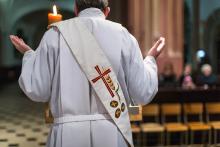
The Rev. Frank Pavone, a leading anti-abortion crusader and Donald Trump supporter, was jubilant on Nov. 9 after his candidate’s surprising win in the presidential race.
But the head of the Staten Island-based Priests for Life group is also facing a stern rebuke and investigation from his bishop, over Pavone’s shocking election eve video, in which he posed with an aborted fetus on an altar while delivering a 44-minute appeal to voters to elect the Republican nominee.

Behind the scenes, for example, the two candidates – who couldn’t bring themselves to shake hands at the third and final presidential debate a night earlier – were brought together by the cardinal during a brief pre-dinner prayer.
“They were both icy from the beginning, you could tell,” Dolan said. “They’re not on each other’s Christmas card list, I can tell you that. You could tell those two had a rather, I’d say, frigid relationship, more than icy.”
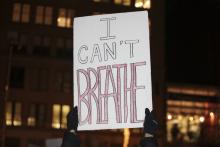
The hospital that dispatched paramedics to treat Eric Garner, who died after being placed in a police chokehold, has agreed to pay his family $1 million. Video of Garner’s arrest shows an officer putting him in a chokehold as Garner yells, “I can’t breathe!” which became a protest slogan for the Black Lives Matter movement. When emergency responders from Richmond University Medical Center arrived, they did not perform CPR.
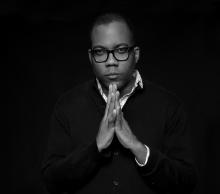
Bio: Jimmie Briggs is an award-winning journalist and author of Innocents Lost, a book giving voice to child soldiers. In 2009, he co-founded the Man Up Campaign, a global effort to engage youth to stop violence against women and girls, and currently serves as executive director of the U.S. branch of Leave Out Violence (LOVE).
1. Let’s talk about LOVE. What issues does your organization address? LOVE’s focus is to engage young people who have been affected by violence of all kinds. This includes not only gender-based violence, but also issues such as gun violence, witnesses of domestic violence, and trauma- processing in schools where violence is the reality. LOVE uses media arts coupled with a trauma-informed response. We have a social worker for one-on-one counseling, and our teaching artists use media arts to provide pathways for young people who have been affected by violence—survivors and witnesses, even perpetrators—to express their voice and ultimately to process their pain, their trauma, and sometimes their guilt from the violence.
At the same time, LOVE creates a stage for them to speak about their experiences and advocate among their peers about conflict resolution and violence prevention. The arts offer a way to heal and process the violence you’ve experienced, but also for you to reach your peers and mitigate violence from happening in your schools, your home, and in your communities.
FATHER PAUL DROVE US in one of the two parish cars. There were five of us boys. The parish cars were Buicks, and they were huge and black. It was late September. All five of us were 13 years old.
Now that we had achieved the age of reason we were allowed to visit the seminary to begin the process of discernment. Father Paul had high hopes but low expectations. If even one of us expressed serious interest in a second visit to the seminary, he would count the weekend a roaring success and no mistake, as he told the pastor.
They were leaning against the car as we climbed in. The pastor was a monsignor. A mon-signor was halfway between priest and bishop. We had a choice of seminaries, said Father Paul to us as we drove off. We could visit the Capuchin seminary or the Franciscan seminary. They were in the same town up on the river, and both in his experience were excellent in shaping good priests.
One of us voted for the Franciscans because he had a dog and Francis loved animals, and three of us voted for the Capuchins because the word Capuchin was cool. I voted for the Capuchins because my dad’s best friend was a small hilarious Capuchin, so as far as I knew the Capuchins were small and hilarious and cool.
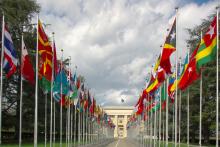
IN APRIL, THOUSANDS of people from across the United States and the world, joined by activists and A-bomb survivors from Japan, will flock to New York to demand that the nuclear powers fulfill their nuclear Non-Proliferation Treaty (NPT) obligations to negotiate a legally binding agreement to completely eliminate their nuclear arsenals.
The NPT Review Conference, held at the U.N. every five years, presents an important opportunity for the 189 signatory nations and for civil society to ensure that this treaty is implemented. The treaty rests on three pillars: 1) non-nuclear states forswear becoming nuclear powers; 2) all signatory nations have the right to generate nuclear energy for peaceful purposes (a serious flaw); and 3) the P-5 nations (U.S., Russia, Britain, France, and China) are obligated to engage in good-faith negotiations to completely eliminate their nuclear arsenals.
Forty-five years after the treaty went into effect, the P-5 have yet to fulfill their part of the bargain, leading to a loss of faith by a growing number of nations and the danger that some will opt out of the treaty to equalize the imbalance of nuclear terror. With the U.S. and Russia having engaged in nuclear war exercises during the Ukraine crisis, simulated U.S. nuclear attacks against North Korea, the U.S.-Chinese arms race, and India and Pakistan again at loggerheads, April’s review conference provides a critical opportunity to press for nuclear weapons abolition and to build the nuclear disarmament movement.
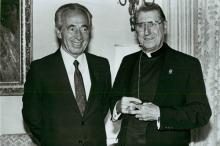
In April 1908, Dorothy Gumple, a 19-year-old Jewish woman living in Connecticut, converted to Roman Catholicism. Less than two years, later she married a Catholic immigrant from Ireland. They and their five children lived in Philadelphia where her husband was a lifelong trade union member. It is not exactly the stuff global news stories are made of.
Except this: Their fourth child became the world-famous archbishop of New York, Cardinal John J. O’Connor, who served in that position from 1984 until his death in 2000.

DOMINIC WAS 17 years old when the incident occurred. Dressed and ready to go to church, he walked out of his home in the Bronx just a few minutes ahead of his parents. All of a sudden, undercover police officers came out of nowhere, grabbed him, and threw him to the ground. As his parents came outside and discovered this scene, fear gripped them as they screamed to the officers, “What are you doing to my son?” “He fits the description. You stay out of this!” the officers replied. His mother pleaded, “Sir, he hasn’t done anything. He has been with us the whole time.”
While legal and political measures are being undertaken by opposing factions for and against the stop, question, and frisk practices of the New York Police Department, the debate rages. The fact remains, no matter what side you are on, considerable damage has already been done to a generation of African Americans and Latinos (particularly youth), not only in New York City but in other cities that have adopted this model of policing.
According to a recent analysis by the New York Civil Liberties Union, in 2012 “New Yorkers were stopped by the police 532,911 times. 473,644 were innocent (89 percent).” This means that out of more than half a million who were stopped, only 59,267 people were charged with any sort of illegal activity. In addition, 284,229 (55 percent) were African American and 165,140 were Latino (32 percent), most of them law-abiding citizens who were targeted, stopped, questioned, frisked, and found innocent. What is further troublesome is that not all actions conducted by officers were documented, so the actual number of those impacted negatively is even higher.
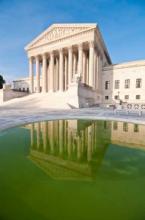
WASHINGTON — In a case that could determine restrictions on expressions of faith in the public square, the Supreme Court on Wednesday will consider religious prayers that convene government meetings.
At issue in Greece v. Galloway is whether such invocations pass constitutional muster, even when government officials are not purposefully proselytizing or discriminating.
Can a town council, for example, open its meetings with prayers invoking Jesus Christ, as happened repeatedly in the town of Greece, N.Y.?
“There’s a whole lot at stake here,” said Ira Lupu, a law professor at George Washington University who specializes in the First Amendment’s religion clauses.
“This case is about first principles: whether the government of a town, acting through its town board, can advance a particular brand of Christianity or any other faith,” said Lupu.
On the other side of the question, Jeff Mateer of the Texas-based Liberty Institute invokes free speech rights and hopes the court will reason that government has no business parsing the words of those who wish to pray in a public forum.
American Promise spans 13 years as Joe Brewster and Michèle Stephenson, middle-class African-American parents in Brooklyn, N.Y., turn their cameras on their son, Idris, and his best friend, Seun, who make their way through one of the most prestigious private schools in the country. Chronicling the boys’ divergent paths from kindergarten through high school graduation at Manhattan’s Dalton School, the documentary presents complicated truths about America’s struggle to come of age on issues of race, class, and opportunity. American Promise is an Official Selection of the 2013 Sundance Film Festival.
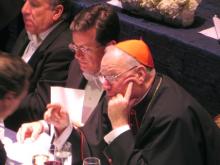
The great and the good — and lots of politicians and TV pundits, too — gathered Thursday to hear comedian Stephen Colbert roast and toast everyone from Pope Francis to his host for the evening, Cardinal Timothy Dolan.
The 68th annual Al Smith Dinner, named for the first Catholic presidential candidate in American history, at the Waldorf Astoria hotel raised $3 million for New York’s neediest children.
Colbert is a lifelong Catholic, a man who is, as Alfred E. Smith IV said in introducing him, “serious about both his craft and his Catholic faith.” The cardinal — who is also pretty funny — and the comedian first met last fall, and Colbert had Dolan on his show last month. So the archbishop of New York returned the favor by having Colbert headline the dinner.
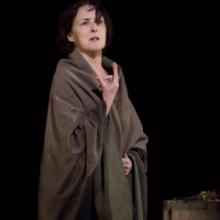
NEW YORK — A Tony-nominated play that offered a controversial take on the Virgin Mary reflecting on her life held its final performance on Sunday, closing after only two weeks as poor ticket sales never matched high expectations.
Now the question is: Why?
Shows fold on Broadway all the time, of course, and as The New York Times noted, just 25 percent of them ever show a profit. But was there something about The Testament of Mary that doomed it to failure?
After all, biblically themed shows are all the rage on television and especially on cable; the recent History Channel miniseries The Bible generated huge ratings, and a host of shows and films are trying to explore — and perhaps exploit — similar territory.
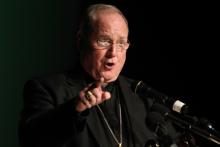
NEW YORK — Walk the streets of Manhattan, especially around St. Patrick’s Cathedral, and ask passersby about Cardinal Timothy Dolan and two things stand out: one, they know who you’re talking about, and two, they like him. Often love him.
Both responses are unusual in the U.S. today: generally, Catholic churchmen are either interchangeable faces to the public, or, if they are known, it’s because of an unflattering headline.
Now Dolan’s extraordinary visibility and popularity are being cited as factors that could make him the first American with a realistic shot at being elected pope when the College of Cardinals gathers in March to elect a successor to Benedict XVI.
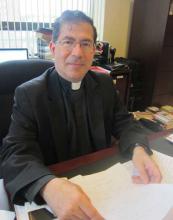
NEW YORK — A year ago, the Rev. Frank Pavone was facing an existential crisis in the unlikeliest of places.
The longtime head of the anti-abortion group Priests for Life, Pavone had been confined to the Diocese of Amarillo by his bishop, Patrick J. Zurek, who sent a letter to every other U.S. bishop declaring that he had so many concerns about the group’s $10 million budget that Pavone shouldn’t be trusted with donors’ money.
Pavone’s backers were stunned, and many stopped giving, which only exacerbated the problems that helped get Priests for Life into trouble in the first place. Pavone also couldn’t go on the road to reassure funders and drum up desperately needed cash.
Instead, the New York-born priest was stuck in a convent in the Texas panhandle where he served as chaplain to an order of nuns in a place called Prayer Town, a virtual prisoner in a war of words with Zurek, who had blasted his “incorrigible defiance of my legitimate authority as his bishop.”

Editor's Note: The following is a transcript of President Barack Obama's remarks to the UN General Assembly in New York City on Tuesday, in which he condemns global violence and extremism, framing the speech around the recent tragedy at the U.S. consulate in Libya.
THE PRESIDENT: Mr. President, Mr. Secretary General, fellow delegates, ladies and gentleman: I would like to begin today by telling you about an American named Chris Stevens.
Chris was born in a town called Grass Valley, California, the son of a lawyer and a musician. As a young man, Chris joined the Peace Corps, and taught English in Morocco. And he came to love and respect the people of North Africa and the Middle East. He would carry that commitment throughout his life. As a diplomat, he worked from Egypt to Syria, from Saudi Arabia to Libya. He was known for walking the streets of the cities where he worked -- tasting the local food, meeting as many people as he could, speaking Arabic, listening with a broad smile.
Chris went to Benghazi in the early days of the Libyan revolution, arriving on a cargo ship. As America’s representative, he helped the Libyan people as they coped with violent conflict, cared for the wounded, and crafted a vision for the future in which the rights of all Libyans would be respected. And after the revolution, he supported the birth of a new democracy, as Libyans held elections, and built new institutions, and began to move forward after decades of dictatorship.
Chris Stevens loved his work. He took pride in the country he served, and he saw dignity in the people that he met. And two weeks ago, he traveled to Benghazi to review plans to establish a new cultural center and modernize a hospital. That’s when America’s compound came under attack. Along with three of his colleagues, Chris was killed in the city that he helped to save. He was 52 years old.
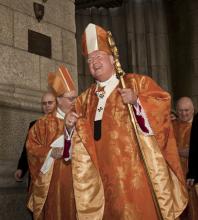
NEW YORK — Cardinal Timothy Dolan, who sparked controversy by agreeing to deliver the closing blessing at the Republican convention in Tampa this week, on Monday drew further attention to his political role by asking both Mitt Romney and Barack Obama to sign a “civility pledge” promoted by a leading conservative Catholic activist.
The archbishop of New York wrote to Romney and Obama, as well as their running mates, Paul Ryan and Joe Biden, asking them to sign the “Civility in America” pledge developed by Carl Anderson, head of the powerful Knights of Columbus and a man with long-standing ties to the Republican Party.
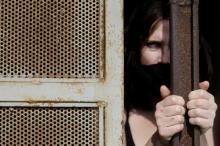
When police from the 115th Precinct raided a brothel a few blocks from Roosevelt Avenue in Queens, N.Y., in January 2011, one of the prostitutes leapt from a second-story window, breaking her leg.
The Korean-born woman, along with others in the apartment, was arrested on charges of prostitution. It was a heartbreaking story, even to JudgeToko Serita, who has heard many of them. “This is the saddest case I’ve seen,” she said.
This desperate act might seem to be an isolated, arbitrary event in the life of a single woman, a misfortune created by a series of bad choices she could have avoided.
But her situation wasn’t simply a result of individual choice; this woman was the product of expansive, organized networks of international crime that enslave women into a life of prostitution, robbing them of all dignity — physical, social, psychological, emotional, spiritual — and even their vocational sense of worth.
“She was so ashamed, she’d rather risk the jump than the public humiliation,” said Stella, the woman’s counselor from RestoreNYC — a four-year-old nonprofit that seeks to help sex-trafficked women in New York City escape and establish new lives. (In order to insure the safety of their clients, Restore staff are identified only by first name.)
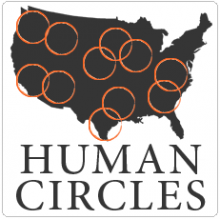
The New York City Human Circle will be replicated throughout across the nation, when faith leaders host Human Circles as members of the Sojourners National Mobilizing Circle, which is bringing together faith and community leaders to organize faith-rooted actions in their communities.
The purpose of these circles is not only to lobby for the poor but also with them.
In case you missed it...
In an OpEd titled, "What the Costumes Reveal," New York Times columnist Joe Nocera wrote about a Halloween office party thrown by the N.Y. law firm of Steven J. Baum, an outfit that specializes in real estate foreclosures -- a "foreclosure mill," if you will -- where, apparently, employees came costumed as homeless and foreclosed-upon families.